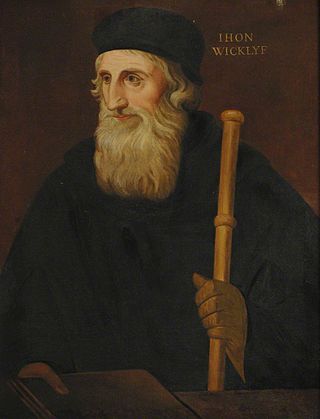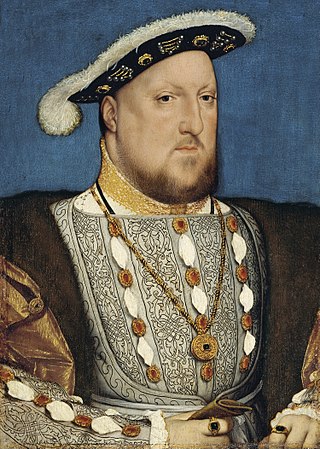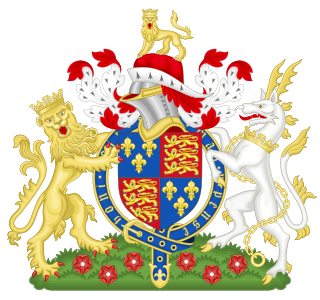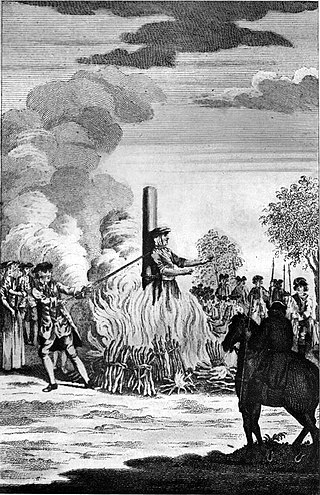The Council of Constance was an ecumenical council of the Catholic Church that was held from 1414 to 1418 in the Bishopric of Constance (Konstanz) in present-day Germany. The council ended the Western Schism by deposing or accepting the resignation of the remaining papal claimants and by electing Pope Martin V. It was the last papal election to take place outside of Italy.

Jan Hus, sometimes anglicized as John Hus or John Huss, and referred to in historical texts as Iohannes Hus or Johannes Huss, was a Czech theologian and philosopher who became a Church reformer and the inspiration of Hussitism, a key predecessor to Protestantism, and a seminal figure in the Bohemian Reformation. Hus is considered by some to be the first Church reformer, even though some designate the theorist John Wycliffe. His teachings had a strong influence, most immediately in the approval of a reformed Bohemian religious denomination and, over a century later, on Martin Luther.

John Wycliffe was an English scholastic philosopher, theologian, biblical translator, reformer, Catholic priest, and a seminary professor at the University of Oxford. He became an influential dissident within the Catholic priesthood during the 14th century and is considered an important predecessor to Protestantism. Wycliffe questioned the privileged status of the clergy, who had bolstered their powerful role in England, and advocated radical poverty of the clergy.

Sir Thomas More PC, venerated in the Catholic Church as Saint Thomas More, was an English lawyer, judge, social philosopher, author, statesman, and noted Renaissance humanist. He also served Henry VIII as Lord High Chancellor of England from October 1529 to May 1532. He wrote Utopia, published in 1516, which describes the political system of an imaginary island state.
The Thirty-nine Articles of Religion, finalised in 1571, are the historically defining statements of doctrines and practices of the Church of England with respect to the controversies of the English Reformation. The Thirty-nine Articles form part of the Book of Common Prayer used by the Church of England, the US Episcopal Church, and the Anglican Church in North America among other denominations in the worldwide Anglican Communion and Anglican Continuum.
The word anathema has two main meanings. One is to describe something or someone that is hated or avoided. The other is to refer to a formal excommunication by a church. These meanings come from the New Testament, where an anathema was a person or thing cursed or condemned by God. In the Old Testament, an anathema was something or someone dedicated to God as a sacrifice, or cursed and separated from God because of sin. These represent two types of setting apart, one for devotion, the other for destruction.

Reginald Pole was an English cardinal and the last Catholic archbishop of Canterbury, holding the office from 1556 to 1558, during the Counter-Reformation.

Algernon Sidney or Sydney was an English politician, republican political theorist and colonel. A member of the middle part of the Long Parliament and commissioner of the trial of King Charles I of England, he opposed the king's execution. Sidney was later charged with plotting against Charles II, in part based on his most famous work, Discourses Concerning Government, which was used by the prosecution as a witness at his trial. He was executed for treason. After his death, Sidney was revered as a "Whig patriot—hero and martyr".

The Westminster Confession of Faith, or simply the Westminster Confession, is a Reformed confession of faith. Drawn up by the 1646 Westminster Assembly as part of the Westminster Standards to be a confession of the Church of England, it became and remains the "subordinate standard" of doctrine in the Church of Scotland and has been influential within Presbyterian churches worldwide.

Henry Chichele was Archbishop of Canterbury (1414–1443) and founded All Souls College, Oxford.
Edward Wightman was an English radical Anabaptist minister, executed at Lichfield on charges of heresy. He was the last person to be burned at the stake in England for heresy.

Wycliffe's Bible or Wycliffite Bibles (WYC) are names given for a sequence of Middle English Bible translations believed to have been made under the direction or instigation of English theologian John Wycliffe of the University of Oxford. They represent the earliest known literal translations of the entire Bible into English. They appeared over a period from approximately 1382 to 1395.
Nicholas Shaxton was Bishop of Salisbury. For a time, he had been a Reformer, but recanted this position, returning to the Roman faith. Under Henry VIII, he attempted to persuade other Protestant leaders to also recant. Under Mary I, he took part in several heresy trials of those who became Protestant martyrs.

In Christianity, the Logos is a name or title of Jesus Christ, seen as the pre-existent second person of the Trinity. In the Douay–Rheims, King James, New International, and other versions of the Bible, the first verse of the Gospel of John reads:
In the beginning was the Word, and the Word was with God, and the Word was God.

The Trial of Joan of Arc was a 15th century legal proceeding against Joan of Arc, a French military leader under Charles VII during the Hundred Years' War. During the siege of Compiègne in 1430, she was captured by Burgundian forces and subsequently sold to their English allies. She was prosecuted by a pro-English church court at Rouen, Normandy in 1431. The court found her guilty of heresy and she was burned at the stake. The verdict was later nullified at Joan's rehabilitation trial, which was overseen by the Inquisitor-General, Jean Bréhal, in 1456. Considered a French national heroine, she was declared a saint by the Roman Catholic Church in 1920. The trial is one of the most famous in history, becoming the subject of many books and films.

The English Reformation took place in 16th-century England when the Church of England broke away from the authority of the pope and the Catholic Church. These events were part of the wider European Reformation, a religious and political movement that affected the practice of Christianity in Western and Central Europe.

The Suppression of Heresy Act 1414 was an Act of the Parliament of England. The Act made heresy an offence against the common law and temporal officers were to swear to help the spiritual officers in the suppression of heresy. Justices of the peace were given the power of inquiry; to issue an order to arrest; and to hand over the suspected heretic to the ecclesiastical court for trial.

Under Charles I, the Puritans became a political force as well as a religious tendency in the country. Opponents of the royal prerogative became allies of Puritan reformers, who saw the Church of England moving in a direction opposite to what they wanted, and objected to increased Catholic influence both at Court and within the Church.

In England, burning was a legal punishment inflicted on women found guilty of high treason, petty treason, and heresy. Over a period of several centuries, female convicts were publicly burnt at the stake, sometimes alive, for a range of activities including coining and mariticide.

The Oldcastle Revolt was a Lollard uprising directed against the Catholic Church and the English king, Henry V. The revolt was led by John Oldcastle, taking place on the night of 9/10 January 1414. The rebellion was crushed following a decisive battle on St. Giles's Fields.














